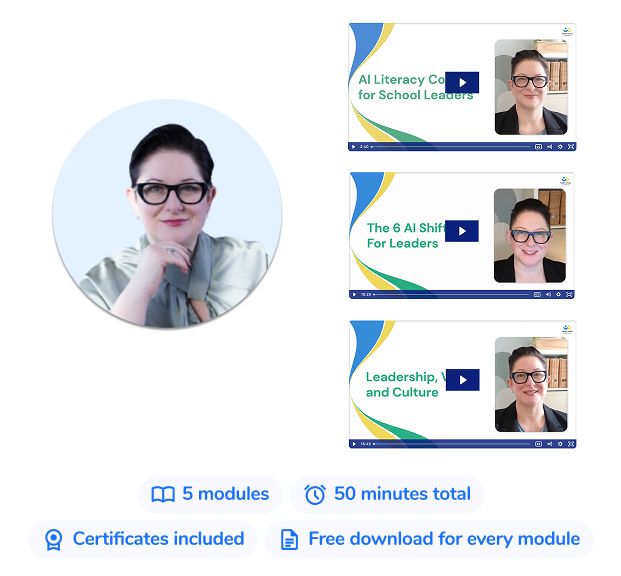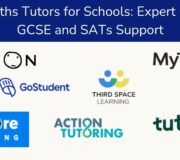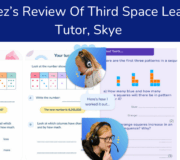Online Tutoring: A Complete Guide To Everything Schools Should Know Before They Start
Online tutoring is a popular tutoring option for schools as it provides students with the flexibility to learn at their own pace, with access to experienced tutors and interactive lessons. New studies show that online learning is often more effective than face-to-face methods in terms of engagement and retention rates.
Research from the Education Endowment Foundation found one to one tutoring is one of the most effective catch up interventions. Students enrolled in one to one tutoring made on average 5 months of progress. This progress was the same, regardless of whether tutoring took place online or face to face.
This blog looks at what constitutes as online tutoring in light of AI developments in schools, the benefits of online learning and what to look out for when looking for an online tutoring platform.
What is online tutoring?
Online tutoring is a form of education that takes place over the internet in real time. Online tutoring is usually provided by highly qualified tutors, or an AI tutor to help students with online learning.
Often, online lessons take place one to one so they can be personalised or tailored to meet the learning needs of each student across a a range of subjects, including maths, computer science, and popular GCSE subjects. Online tuition lessons often use interactive whiteboards within a virtual classroom.
Many online tutoring platforms, like Third Space Learning, offer free resources and tools to support students in their online learning journey.
Online tutoring experts
Since 2013, Third Space Learning has provided online tutoring to 170,000+ children in primary and secondary schools across the UK as part of a maths intervention programme.
Drawing on more than 10 years of experience and over 2 million hours of online tutoring insights, our qualified teachers and maths experts have developed spoken AI maths tutor Skye.
This article acts as a guide covering all the aspects of online tutoring in the UK that you need to know about, including AI tutoring, including primary AI tutoring and GCSE AI tutoring.
School leaders and teachers should consider this guidance to ensure you choose the most effective maths interventions for your school.
The Ultimate Guide to Maths Tutoring
Learn how to choose, plan and fund the right tutoring approach for your students for maximum impact. Includes individual primary and secondary guides.
Download Free Now!Who is online tutoring best suited to?
Typically, online tutoring is best suited for KS2 tutoring and older, but it may also work for children in KS1. Over a decade of online tutoring experience and understanding how it works effectively has taught us that KS2 and secondary students and older can make the most out of online tutoring sessions.
The requirements for online tutoring are usually just that all participants have an internet connection with sufficient bandwidth and a device to receive or deliver the online lesson.
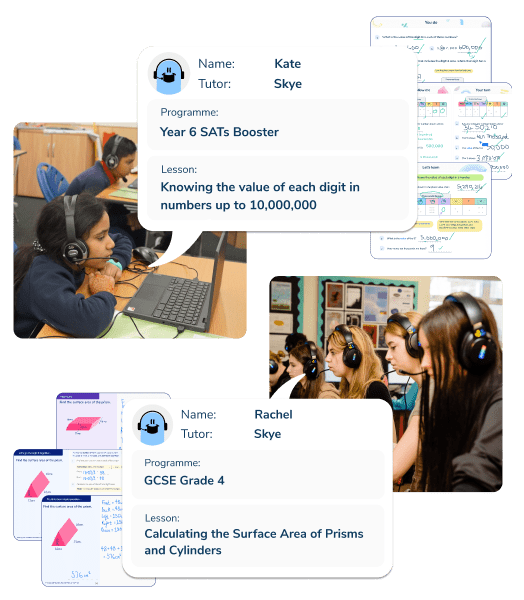
How does online tutoring work?
Online tutoring can vary from person to person and from one tutoring organisation to another.
A few of the ways online tutoring works include:
- Standard Skype or Zoom video chat with both the online tutor and the student showing their work / instruction to the webcam
- A bespoke online virtual classroom environment where the tutor follows a carefully worked out programme of lessons often using functionality similar to an interactive whiteboard
- A ‘shared screen’ type approach where the tutor screen shares and potentially annotates it for the student to follow, possibly with a messaging function
Third Space Learning’s online intervention uses a virtual classroom. Both the student and Skye use the interactive classroom and communicate verbally, and the student can see Skye’s avatar, but Skye cannot see the learner.
Each lesson includes easy, quick click buttons, tools and mathematical symbols to help students and Skye communicate their verbal explanations.
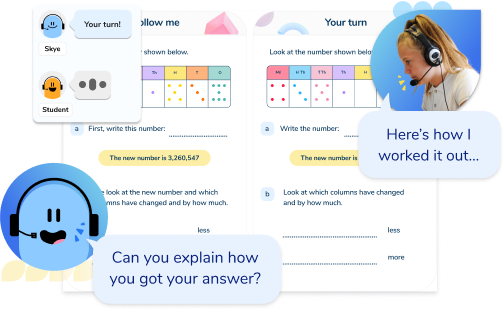
What are the benefits of online tutoring?
Online tutoring provides all the benefits of face to face tutoring but with much greater convenience as lessons can be scheduled at a time convenient to school schedules and to multiple students simultaneously.
The benefits of online tutoring are covered in detail below, but broadly, schools choose online tutoring for one of four reasons:
- Improve exam technique and ultimately achieve grades, whether that’s tutoring for SATs, GCSE or A Levels across all exam boards;
- Close learning gaps through catch up one to one tuition, or support students who need it most;
- Enable a child to accelerate their progress further and faster than they would in a class of 30+;
- Build confidence in a subject and develop the habits of learning so that they can respond better in all their lessons.
Find out how schools are using online AI tutoring with Skye to improve maths outcomes for all of their learners.
10 benefits of online tutoring
Here we look in more depth at the 10 key benefits of online tutoring:
- Online tuition is convenient
- Greater choice of tutor quality
- Easier to match students to the right tutor
- More fun and engaging
- Takes place in a familiar environment
- Online tutoring providers offer tutor training
- Often cheaper than in-person tutoring
- Safe and secure
- Improves students’ technology skills
- Online resources between sessions
1. Online tuition is convenient
Between lessons, interventions, marking and after school clubs, it’s challenging to find a regular slot that schools and students can commit to each week.
Online tutoring helps alleviate the stress around scheduling by removing the travel, either for the student to a tuition centre or the tutor to the school or home. Online tutoring organisations are often more flexible with time slots because of this.
Convenient scheduling
With AI maths tutoring, online lessons are even more flexible. Sessions can be scheduled up to every 5 minutes before, during or after school to accommodate even the busiest of timetables. You’re also free to swap session times and students at any point.
Additionally, schools can choose to launch sessions on demand to meet the needs of the learner with same-day interventions.
Every school is assigned to a dedicated account manager who will help you through any scheduling queries.
“We can also use Skye for same-day interventions. If we have a group of children who haven’t grasped a concept in their morning lesson, we can take them out and get it sorted with Third Space Learning in the afternoon.”
Lucia Romey, Assistant headteacher,
Danegrove Primary School
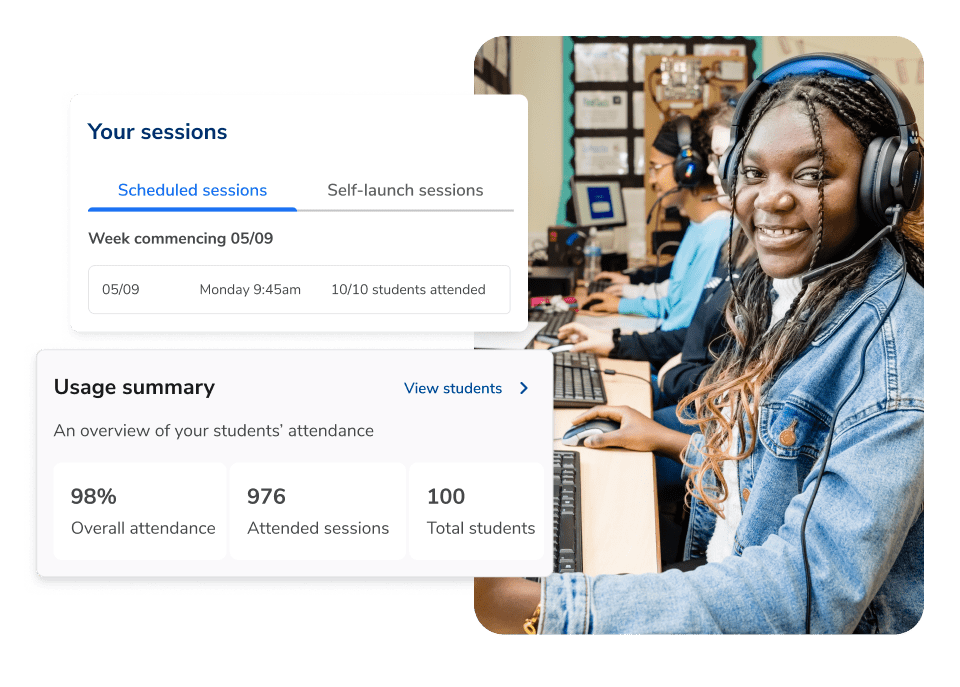
2. A greater range of the best tutors online
With little time and tight budgets, finding a tutor who is highly qualified and specialises in certain subjects, such as maths or science, is challenging for schools.
Opting for online tutoring, the hard work is often done for you.
Choosing an online tutoring organisation with a rigorous selection process and background checks ensures that they use only the best tutors. This means that your students receive the highest-quality tuition they can, and you avoid trawling through the vast pool of underqualified tutors who set themselves up with few qualifications or credentials.
Tutor quality with Skye
Because our team of qualified teachers and maths specialists write every online tutoring lesson to align with the national curriculum and every prompt for Skye, you can be confident that your students are receiving the best maths tutoring.
Skye only uses content written, quality-checked and approved by the academic team; it never deviates off-topic.
As Skye is an intelligent tutoring system, its delivery is consistent and non-judgmental, ensuring learners feel safe to explore the concepts they find difficult with a growth mindset.
If you’re looking for online tutoring, here are the best online tutoring websites and, specifically, the best online maths tutoring platforms for UK schools.
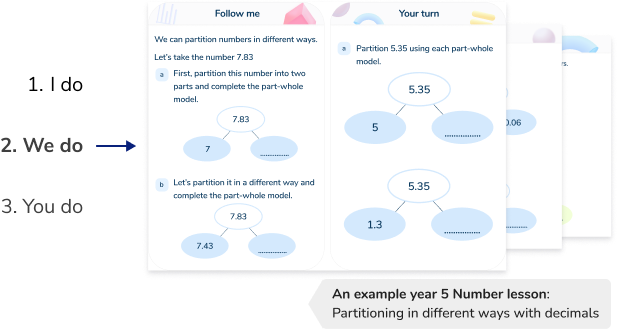
3. Students can be matched to the best online tutors for their needs
Finding the right online tutor for your school’s context and your student’s needs can be difficult and time-consuming.
If you’re less familiar with tutoring, it can be even more difficult to know which tutor is right for your school.
- Do you go with the one that you like the most?
- Do you choose a recommended tutor?
- Or do you pick the tutor with the best CV?
One of the benefits of online tutoring is that the hassle of picking the right tutor is taken out of the equation. Algorithms make finding the right tutor easy. Answering a few questions on a child’s likes, dislikes, confidence and other attributes or a computer could be able to match your child with the right tutor.
This saves the dozens of phone calls and meetings that can come with finding an in-person tutor!
4. Online tutoring is fun and engaging for children
Engaging lessons? Even in subjects like maths? Yes, it’s possible!
Some topics, including maths, can be tricky for many young minds. Engaging lessons are crucial to help keep learners focused on the learning.
Thanks to the versatile nature of online classrooms, lessons can be highly personalised to each child.
There is no need to read from old textbooks when learning online. The responsiveness and engagement of online learning are something that children love.
Reducing cognitive overload
Online lessons with Skye are built to engage children while reducing cognitive overload. Each session slide uses a blur function to ensure students only focus on the parts of the slide they need.
Sessions also follow an evidence-based I do, we do, you do structure to take learners from guided to independent practice at their own pace for optimal engagement.
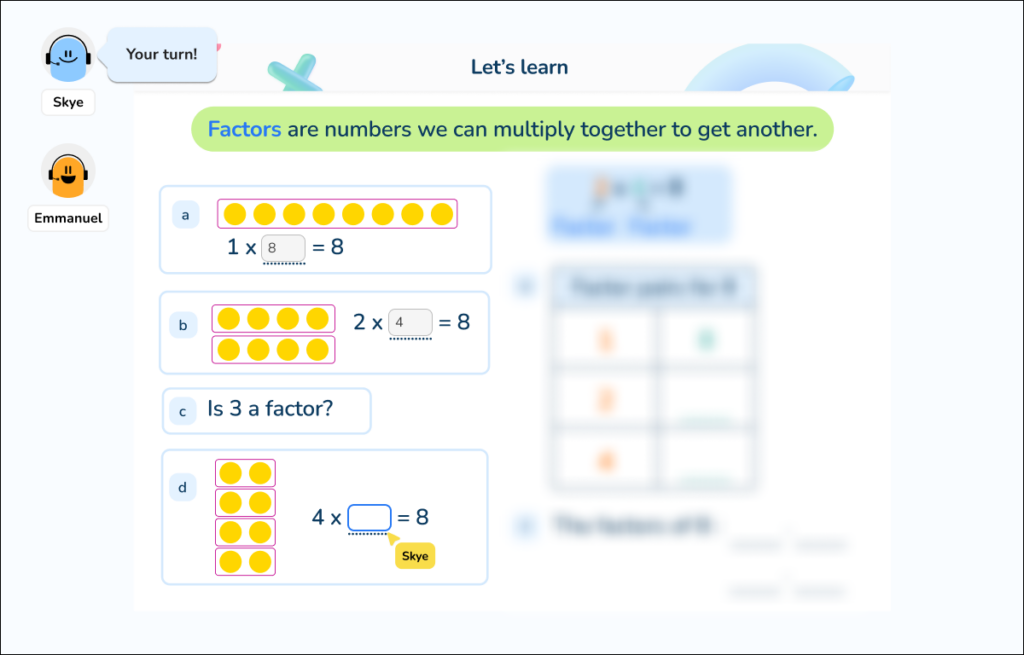
5. Learning takes place in a comfortable environment for each child
Depending on the age and confidence of your students, introducing them to a tutor is sometimes an intimidating experience.
Face-to-face in-person tutoring sometimes causes anxiety for a young person, especially if it’s in a subject they are not confident in. However, present them with the chance to chat with a tutor online over a headset, and they will likely find the learning experience much more appealing.
One advantage of online tutoring is that it takes place in a familiar environment. If students are more comfortable in their surroundings, taking part in an activity they probably enjoy (working online), then they will get a lot more from the tutoring sessions.
Safe learning environment
Many of the schools we work with have reported that their learners feel happier and more confident verbalising their thinking with AI tutor Skye than with a traditional tutor. For these learners, particularly secondary students, the AI element eliminates the judgment they feel they may receive from traditional tutors.
Find out more about why spoken AI tutoring is better for learning than text-based tutoring.

6. Online tutoring sites tend to have more training options for their tutors
If you choose to work with a larger, established online tutoring organisation, many have their own tutor training programmes. However, be wary as this may only be a few hours initial training online.
CPD
Students are at the heart of everything we do here at Third Space Learning, and our academic team is constantly developing and improving Skye to ensure it uses the most effective teaching strategies.
Because every lesson and prompt for Skye is written by qualified teachers, your learners always recieve effective, curriculum-aligned content. Keeping humans in the loop is central to our AI tutoring.
7. Online tutoring is cheaper than in-person tutoring
Face-to-face tutoring can vary hugely in cost depending on where you live. Tutors and tutoring companies set their own rates, ranging from £30 an hour to £80 an hour for a tutor with a great track record in accelerating progress.
Weekly sessions keep up the learning momentum and ensure steady progress. But payment is usually taken in advance per half term or term, adding up to a substantial sum, even when discounts are often available for block bookings.
With budgets growing ever tighter and intervention programmes usually costing about the same as private tutoring, value for money is important for schools.
Thanks to the lower overheads and elements like travel costs taken out of the equation, online tutoring is competitively priced around £25-£30 per hour. Shared online lessons can cost as little as £15. This makes it a great option for schools who want a quality service that won’t break the bank.
One low fixed annual fee for AI tutoring
AI tutoring with Skye is creating affordable tutoring for schools at a time when budgets are tighter than ever.
Rather than paying per pupil or per session, schools pay one low annual cost for unlimited sessions for every single learner who needs it. No extra fees for adding extra learners and no hidden costs, just a low annual upfront cost.
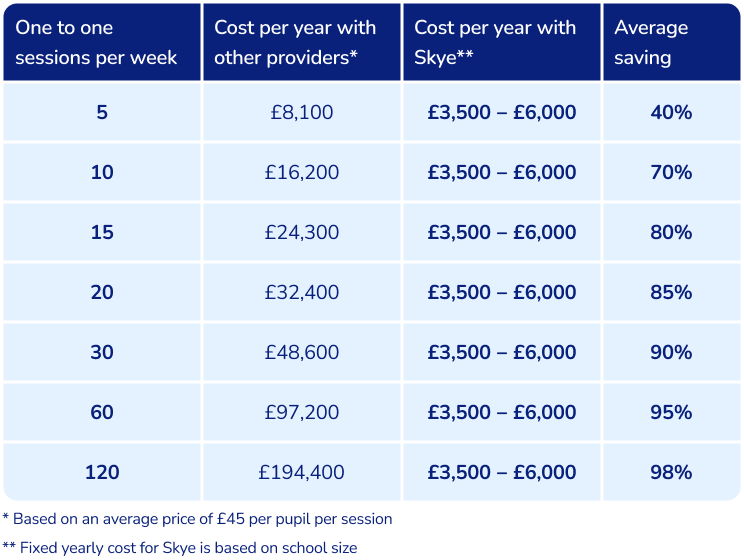
8. Online tuition is safe and secure
As sessions take place in the student’s school environment, students feel safe in a familiar environment, and a staff members can oversee sessions.
Additionally, enhanced background checks for tutors are conducted, including DBS checks and platforms often employ an internal safeguarding officer focused on student safety.
Once on board, online tuition allows companies to monitor and record lessons to ensure tutors follow safeguarding procedures carefully.
This transparency is not always possible with face to face tutoring and is an excellent way to uphold safety standards.
Safeguarding built in
Every session is recorded for safeguarding purposes, and Skye raises a red flag when it recognises a safety concern. Third Space Learning’s designated safeguarding lead is notified of the red flag and assesses the situation immediately.
Students can only message Skye through the safe platform. If learners start off-topic discussions, Skye brings them back to the maths learning at hand.
Whenever using AI tools or AI tutoring, schools should implement an AI policy to ensure the safe use of AI.
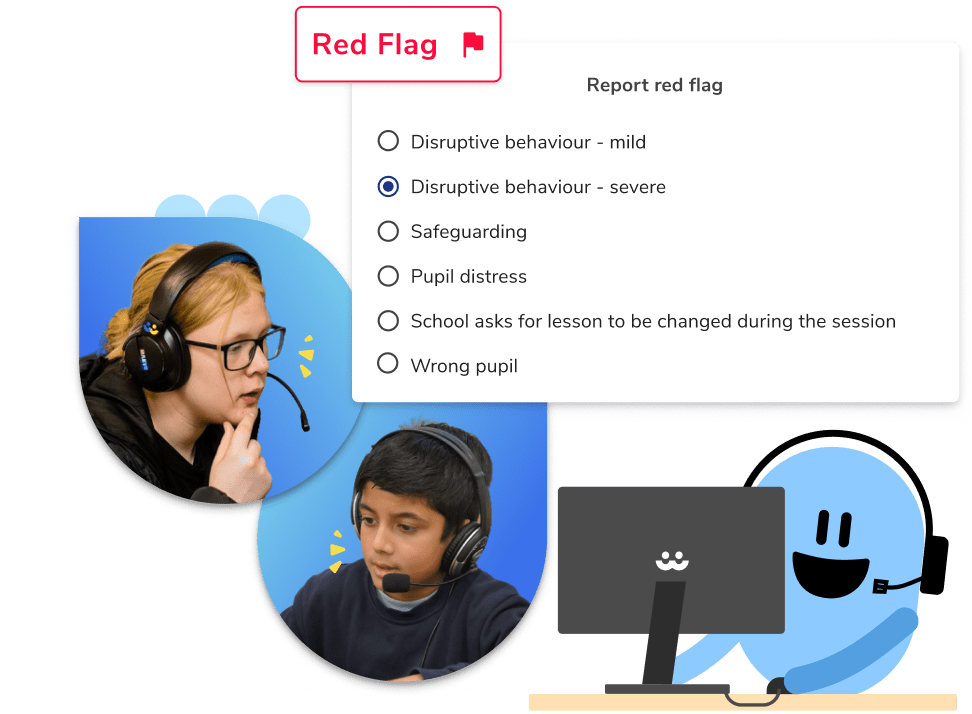
9. Online tutoring helps improve students’ technology skills
Online tutoring gives children a great place to practise their all-important digital skills.
While students focus on the lesson within the tutoring platform, they inadvertently improve their digital and communication skills. These skills are useful in further study and transitioning into the world of work.
10. Online resources and homework between lessons
With online tuition comes the other benefits the online world brings, namely a host of free resources and advice. The best online tutoring and best online tutoring maths sites provide customer support to help you manage and troubleshoot your online tutoring, as well as teaching resources, worksheets and activities to support every student.
Free resources for online learning
All Third Space Learning maths resources are created by qualified teachers and maths experts to ensure they align with the UK national curriculum.
For primary pupils, the Third Space Maths Hub is full of hundreds of free and premium maths resources to support learning. Secondary schools can find a host of free resources in the Secondary Resource Library.
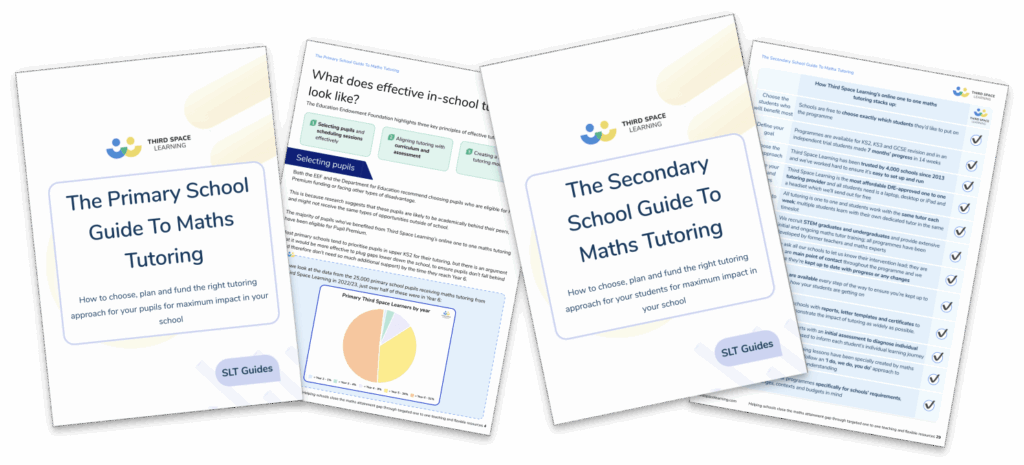
One to one or small group online tuition?
Generally, when talking about online tutoring, we’re referring to one to one tutoring lessons where one professional tutor teaches one student over the internet, adapting to the student’s needs. However, online tutors can also provide group tutoring.
Once the group size reaches more than 5 or 6 students, this is referred to as online teaching as many of the focused personalisation benefits of online tutoring are lost in a larger group size.
If you’re looking to invest in online tutoring one to one tuition is likely the best option. Personalised lessons suited to the pace and pitch of the individual present enormous benefits for the student. Plus, tutors can adapt lessons in real time based on the individual’s understanding and progress
FAQs about online tutoring
The best online tutoring site will depend on the requirements of the student needing the tuition, especially subject areas and age. The best online tutoring site for maths is Third Space Learning because we are specialists in tutoring many thousands of students online one to one and have qualified teachers creating out online tutoring lessons. Thanks to our professional tutor training, diagnostic assessment of children’s gaps and then their progress, as well as our exhaustive curriculum coverage and quality of our lessons, we believe we now are the best online tutoring site altogether. At least that’s what our customers in school and at home tell us.
Yes, online tutoring really works, but generally it works best if it’s one to one and focused specifically on an individual learner’s needs. Provided the technology is sound and you find a well trained, qualified tutor, it will be as effective as face to face tutoring – and often, if the child is more engaged online – then more effective.
Online tutoring with Third Space Learning can double a child’s progress over a period of 14 weeks. We ran a trial using a standardised assessment test and children who received our one to one online maths tuition achieved double their expected progress. They made 28 weeks progress in 14 weeks. Find out more in our case studies from schools who’ve seen excellent success with our online tutoring.
Online tutoring is very safe. Provided, of cours,e you do the right checks in advance. Every tutor must have a DBS or DBS equivalent, just as you would check for a face to face tutor.
Online tutoring tends to be a lot cheaper than in person tutoring. Costs with most tutoring services start at £15 per lesson up to about £35 for the most expensive tutors.
Third Space Learning is on a mission to make the effectiveness of one to one tuition available at a price point that everyone can afford. We always encourage schools to book a call with us so we can work out pricing for their specific situation and the number of students requiring tuition.
The introduction of the National Tutoring Programme has made tuition even more affordable. This is catch up funding for schools to support children who’ve fallen behind during school closures. The tutoring organisations, including Third Space Learning, are all registered providers so you can be sure you will receive quality-assured tutoring at an affordable price.
DO YOU HAVE STUDENTS WHO NEED MORE SUPPORT IN MATHS?
Skye – our AI maths tutor built by teachers – gives students personalised one-to-one lessons that address learning gaps and build confidence.
Since 2013 we’ve taught over 2 million hours of maths lessons to more than 170,000 students to help them become fluent, able mathematicians.
Explore our AI maths tutoring or find out about online maths tuition for your school.
